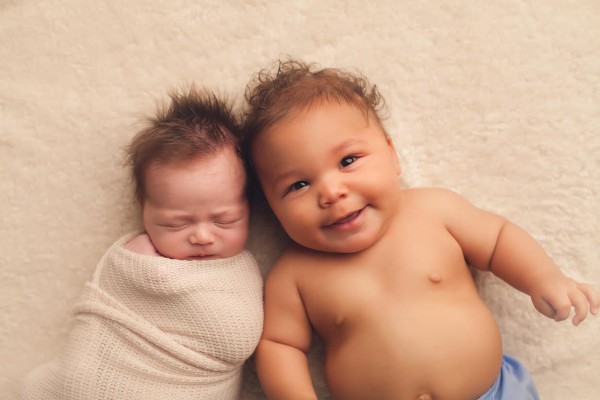We are often asked ignorant and prying questions about our adoptive transracial family that can lead to hurt, frustration, and furrowed brows. I’m learning to respond with grace and understanding while also protecting our family.
“Are they twins?” is a question we are frequently asked. “No,” we kindly respond while attempting to move on before the gauntlet of questions begins. Inevitably, the prying questions are hurled at us in conjunction with puzzled facial expressions: “Are they both yours?” (Yes). “How far apart are they?” (About five months). “How is that possible?” (Adoption. One was adopted).

Once the first onslaught of prying questions have been thrown at us and we think the conversation has come to a close, a slew of hurt is hurled in the form of more ignorant questions: “Was his real mom young and on drugs?” “Did you get pregnant after you adopted?” “Did you adopt because you couldn’t get pregnant?” “How much did he cost?” And so on the hurtful, misinformed, and poorly worded questions are asked.
As an adoptive mom, I desire for others to learn about the beauty of adoption. I am pro adoption-education. But I am also protective of my family. I want my son’s adoption story to be his own. So at times I struggle to find balance between sharing educational information and protecting my son’s privacy (as well as the privacy of his first family.) I am constantly attempting to answer questions in a way that honors both education and privacy.
Some people are genuinely curious, trying to expand their knowledge of what adoption is and how it works, while others are just plain rude, working up their own misinformed assumptions in their head. The first rule in answering adoption questions is that you do not owe anyone any answers, but if you choose to engage in a conversation, here are some suggestions.
A great way to answer extremely personal questions regarding your family and adoption is to rephrase the questions into more general terms about adoption.
Q: Was the mom on drugs? Was she young? Does she have other kids? Was she forced to give up her child?
A: We were presented with many expectant moms; we learned that their ages and life situations varied greatly.
A: There are a lot of reasons moms choose to make an adoption plan.
Q: What’s his real mom’s story?
A: I am his real mom.
A: If you mean his biological or first/birth mom, that is not my story to share.
Q: Did she not know about birth control?
A: We see all children as a gift.
Q: Did you adopt because you couldn’t get pregnant?
A: There are a lot of reasons people pursue children via adoption.
Q: Are they real siblings?
A: Yes, very real.
Side note: People are usually wondering if they are biological and equate that with “real,” which can be very detrimental to your child’s heart. You can choose to ask them “Do you mean biologically?” or leave it at “Yes.” Remember that you owe them nothing.

Q: How much did he cost?
A: I did not purchase my child, I paid for legal fees. (Similarly, biological parents pay for hospital/midwifery fees).
Q: How much did your adoption cost?
A: Adoption costs vary, depending on an array of factors such as the type of adoption and the situation in which the adoption plan was made.
A: The average domestic infant/international/foster care adoption ranges from _____.
Q: He is lucky.
A: He would be lucky if he were with his birth family; we are the lucky ones.
Q: Do you have/want children of your own?
A: He is very much my own child.
Q: What is his heritage/ethnicity/nationality/race?
A: I am unsure of his heritage because we did not ask his ancestors where they are from, but his race is Hispanic/Latino/biracial/black/African American/Indian/etc.
A: He is American/Ugandan/Mexican (regarding nationality, depending on the country he is from).
Side note: the terms heritage, ethnicity, nationality, race, and culture can be confusing. Once we familiarize ourselves with the differences of each, we can then further educate. Because the terms can be so confusing, often times the person asking isn’t even sure what they want to know and you don’t owe them anything. You can always answer with, “Why do you ask?” or “Do you mean what is his race?” Read about the varying terms here.
The hurt of these questions affect us as parents, yes, but the real frustration resulting from these questions comes from a mama-and-papa-bear love for our kids. The words of others can do such damage, especially when your child hears the questions constantly. Remember that protecting the heart and story of your child are what guide you in your answers; he is listening to your response whether he appears to be or not.
Remember: You owe strangers nothing. You also don’t owe friends and family members anything. When your answers clearly don’t meet their expectations of openness, do not feel any need to share further. This is your child’s story.
If anything, you can respond by asking, “Why do you ask?” or “Would you repeat that question?” or “Does that matter?” Inviting the person to think about what they said/asked can really help them stop and realize how inappropriate the question or comment was.
Our hope is to have an ongoing open dialogue in our family about adoption and race. As parents, we see it as our role to pursue and start these conversations with our kids. Our goal is to prepare them to set healthy boundaries and answer questions confidently without us.
What hurtful questions have you been asked about your adoptive and/or transracial family? How do you respond?
Do you feel there is a hole in your heart that can only be filled by a child? We’ve helped complete 32,000+ adoptions. We would love to help you through your adoption journey. Visit Adoption.org or call 1-800-ADOPT-98.

